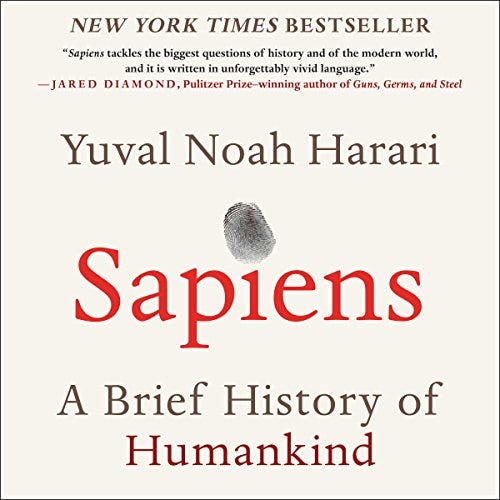Member-only story

Yuval Noah Harari has written a short book¹ that interprets and explains millions of years of human history while also prognosticating about our future as a species. It is ridiculously ambitious, delightfully entertaining, and replete with sweeping generalizations and provocative claims.
Harari begins by explaining that Homo Sapiens (aka Sapiens) is one species in the genus Homo, a genus we share with others like neanderthalensis and erectus. Our ancestors probably interbred with those other species. In fact, many people have up to 6% DNA from neanderthals or erectus (Africans’ DNA apparently shows little cross-breeding with other homo species). What remains certain is that about 50,000 years ago, all the other homo species disappeared, leaving Sapiens.
The Cognitive Revolution
He conjectures that the cognitive demands to socialize in groups drove the growth of the human brain, eventually leading to language and other activities that allowed us to organize more effectively for survival. One of these attributes that emerged from greater socialization and larger brains, was storytelling — the ability to construct imagined realities. Storytelling allowed us to develop beliefs, narratives, and other purely intellectual constructs that furthered our social and organizational capabilities. Harari uses the example of a limited liability corporation — a completely imaginary entity that nevertheless organizes the work of many people, carrying out a mission across time and space because so many people accept the corporation to be as real as a tree or stone. Other animals do not have LLCs but instead live in the tangible, physical world.
Most organisms use the time-tested process of evolution to adapt to their environments. It’s not very efficient or fast, but it is robust because the adaptations are encoded in DNA, which is a stable repository of information. Sapiens bypassed this slow process by enabling mass behavioral changes without going through a painstaking evolutionary, trial-and-error process. By constructing a narrative, a new imagined reality, Sapiens can pivot quickly and adjust to novel circumstances:
“Consider a resident of Berlin, born in 1900 and living to the ripe age of one hundred. She spent her childhood in the Hohenzollern Empire of…